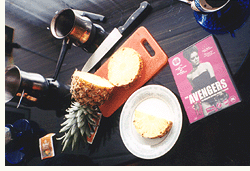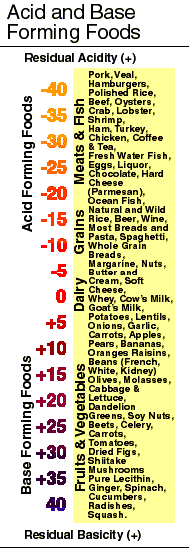Disclaimer: The following material is based on the personal research, experiences and beliefs of the staff of the Institute of Russian Healing Arts, and is not approved by any medical or dietary authority. Use this information only at your own risk. Please, consult your physician before using this information, especially if you are under medical supervision.
 It is crucial to have a good diet, if you want to stay healthy, and is especially important during the process of healing. Your organs and tissues need good nutrition for proper function. Your cells need a balanced supply of building materials.
It is crucial to have a good diet, if you want to stay healthy, and is especially important during the process of healing. Your organs and tissues need good nutrition for proper function. Your cells need a balanced supply of building materials.
Please use creativity to balance your diet in your own personal way. This article intends to provide general guidelines ONLY.
First, you must learn how to monitor yourself on the way to a healthy diet. Here are nine major indicators, you should watch for:
- Fluctuation of energy before and after a meal. After a meal you should feel energized and in a good mood.
- Sensation of heaviness in the head and stomach. This is something that should not happen, especially after meals.
- Sour or bitter aftertaste. Determine the cause and alter your diet accordingly.
- Heartburn or stomachache. If these occur, determine the cause and alter your diet accordingly.
- Your tongue should be nice and clean, free of coating, especially after a meal.
- Condition of the skin. In the long run, healthy skin should be free of acne and black heads, young looking and healthy colored (not grayish, greenish or yellowish).
- Nails should be healthy and shiny (no polishing), without stripes or white lines and dots.
- You should have a bowel movement at least once a day, normal consistency.
- Urine should be normal in color (not too dark or reddish), without offensive smell, and have a good PH balance. See article on urine PH testing.
Now that you know the things to monitor, both short term and long term, let's discuss some major principles of a healthy diet.
Amount of food
The very first principle of a healthy diet is DO NOT OVEREAT! This cannot be stressed enough! Remember, that it is always better to under eat than overeat. Do not stress your digestive system. Even if the food is healthy, organic and perfect for your body, overeating will make it difficult for your digestive system to assimilate vital nutrients, other than fat, from the food. Remember… under eaters live longer!
Chewing
It is easy to disturb the digestive system with poor chewing. Do not run, read or watch TV while eating. Chew and enjoy your food. Good chewing and not overeating help prevent and even heal lots of health problems.
Foods to Avoid and Their Alternatives
- Avoid meat and poultry as much as possible. Try to replace them with fish, seafood and soy products (such as Tofu, "Smart Dogs", Soy Sausage, etc).
- Avoid milk, especially if your system is sensitive to it. Replace with soy or rice milk. There are plenty of such products on the market, and some taste better than others. Find the one that tastes good to you. Do not overuse cheese in your diet, since it is a mucus-forming product.
- Avoid refined grains. Replace white rice with brown rice. If you eat bread, it should be wholegrain and yeast free. Avoid boxed cereals, since they are heavily processed. Replace them with oatmeal, kasha, and other non- or lightly-processed grains. Pasta made from processed wheat can be easily replaced with brown rice or whole-wheat pasta.
- Avoid starches, especially in corn, potato, and white rice. Starch-rich foods tend to strain the liver.
- Avoid vinegar in any form (salad dressings, Mayonnaise, pickles and so on). If you need to use vinegar, use apple cider vinegar. For salad dressing use olive oil with lime juice, or find dressing made with apple cider vinegar. Vinegar degrades mucus membranes in the digestive tract, causing inflammation.
- Avoid processed sugar in any form, especially cookies and pastry. Replace with small amounts of honey, small amounts of maple syrup, or use Stevia based products such as "Stevia Sweetener."
- Avoid soft carbonated drinks such as Sprite, Coca-Cola, Pepsi and similar. These drinks are a serious danger for the mucus membranes of the stomach.
- Avoid fried food as much as possible, especially if you have a liver or pancreas condition. Try fat-reducing broiling process or stir-fry.
- Avoid fast food.
- Avoid tap water, since it is a prime source of bacteria, fungus, and chlorine which destroys cells in the body. Replace with bottled spring water, or use a good filter or water ionizer.
- Avoid coffee as much as possible. If you feel the need for it, use organic beans and brew it the old-fashioned way, in the "Ibrik," to avoid acidity and acid aftertaste. You can get this coffee brewer in Middle Eastern or Greek food stores. See our article on Coffee and Health. It is also a good idea to have no more than one cup of black tea a day, or none at all. Limited amounts of Green or Oolong tea are fine.
Distribution of Food
Experiment with how you distribute food through your meals, so you feel a steady amount of energy throughout the day and get a good night's sleep.
Breakfast should usually be light-oatmeal with grinded apple, or crashed blueberries, wholegrain toast, or similar.
Try to survive without coffee in the morning. After a while you will feel a great amount of energy.
Using the nine major indicators above, try to determine which meal should be your major meal of the day in order to get an even distribution of energy through your day, as well as a good night's sleep.
Drinking during Meals
Do not take liquids during mealtime. If you would like to drink something, such as tea, after your meal, wait 20 minutes. Liquids during meals dilute gastric juices which are essential for proper digestion.
Coffee and black tea are good stimulants, but they prevent your system from assimilating iron from the food you eat, which lowers your energy significantly. Don't create a vicious cycle. Avoid them. Food should stimulate you enough by itself. Alcohol is another stimulant, which is really taxing to the system. Simply avoid it.
Acid / Alkaline Balance
All food can be categorized into two basic groups: acid-creating and alkaline(base)-creating. Try to keep your diet on the alkaline side to avoid acid conditions such as cancer, as well as inflammatory processes such as Gastritis, Colitis, Chronic Sinusitis, etc.
Conclusion
There are many nutritional systems you can use on your way to well being. The material presented here is meant only as a guideline on creative use of food to help you master your own unique way of staying healthy.
Good health.
